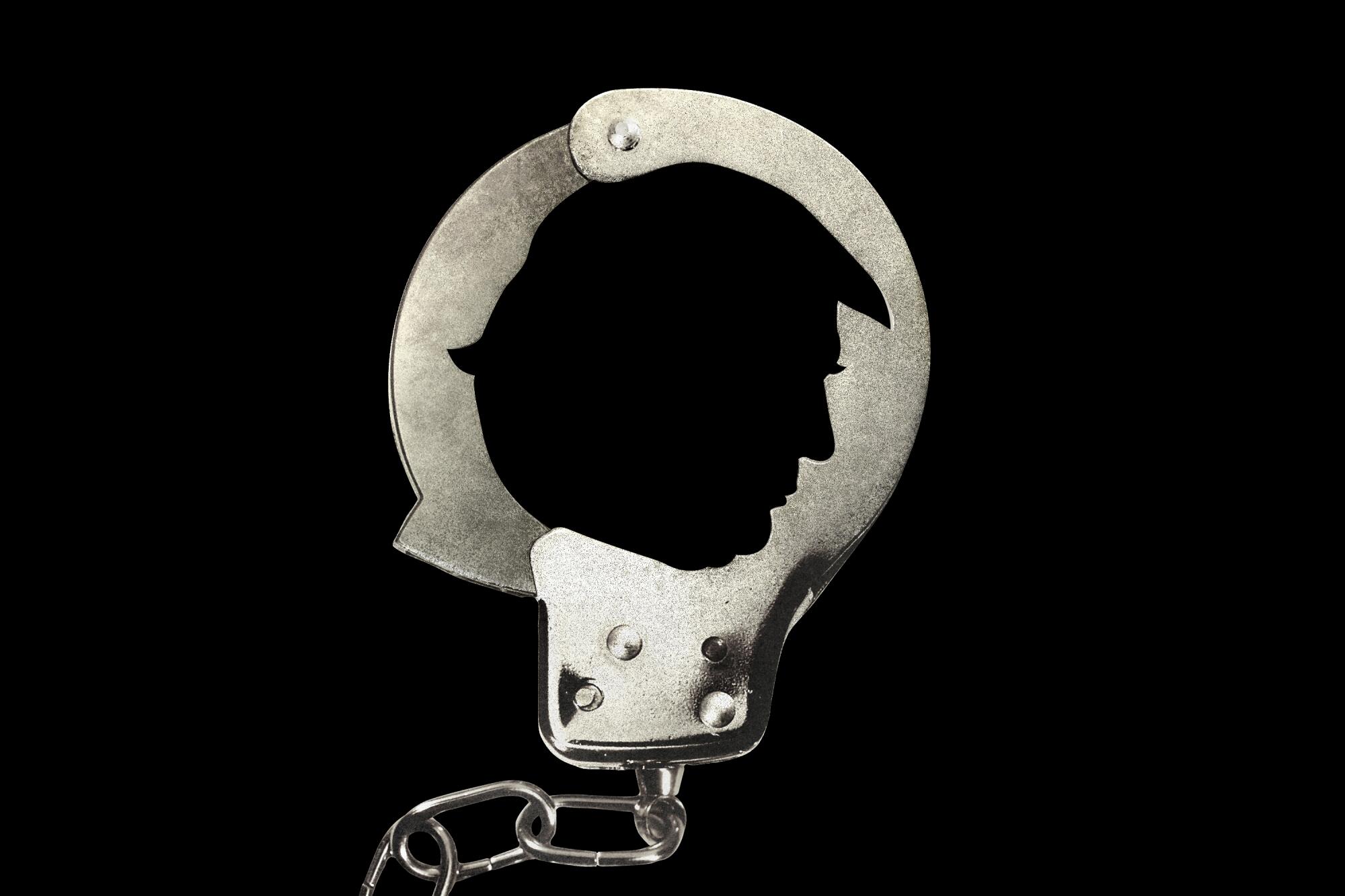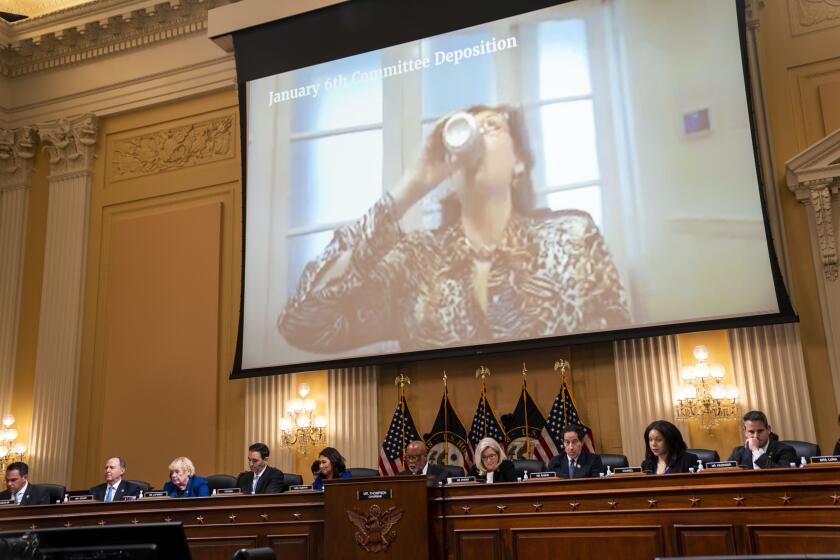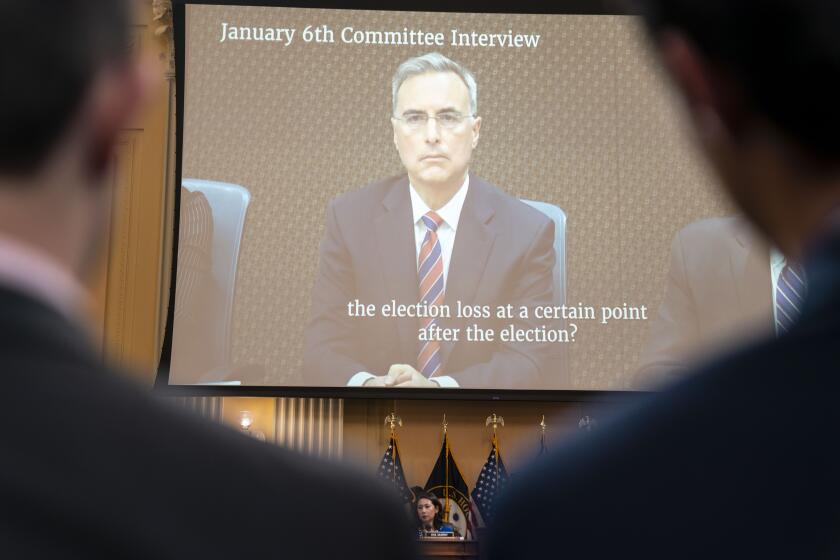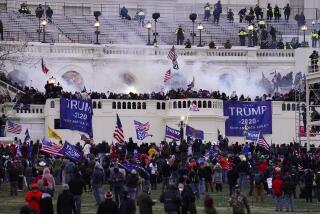
- Share via
Charging a former president with crimes would be an extraordinary development in American history and carries the risk of forever reshaping our politics as well as the very future of the nation. It should not be undertaken lightly.
But former President Trump’s multifaceted attempt to overthrow the results of the 2020 election that culminated with him inciting violent mobs to attack the Capitol on Jan. 6, 2021, as Congress was certifying Joe Biden’s victory, was also an extraordinary development in American history — one that nearly destroyed our democracy. The country is already in uncomfortable, uncharted waters navigating the wreckage Trump left in his wake.
What’s needed now is not genteel deference to political norms but an unflinching pursuit of justice. Over the last two months the House select committee investigating the Jan. 6 attack has meticulously presented with video clips and firsthand testimony ample evidence that the former president led a dangerous, mendacious plot to block the peaceful transfer of power and hang on to the presidency despite being voted out of office. At a minimum, the Department of Justice should prosecute him for conspiring to defraud the United States and conspiring to obstruct an official proceeding, the electoral vote count. These crimes carry maximum sentences of five and 20 years in prison, respectively.
Testimony on Tuesday showed that the criterion at issue for Donald Trump was power. The law, evidence and truth were beside the point.
Of course, prosecutors may have evidence the public hasn’t seen that merits additional charges, and the House panel appears likely to reveal more over the coming months. But already the first eight hearings have shown that Trump was told many times, by several close and well-informed advisors, that there was no evidence of voter fraud or ballot irregularities that would have altered the outcome of the election. “Bullshit” is what Atty. Gen. William Barr called Trump’s claim that the election was stolen.
And yet Trump continued to perpetuate the lie, using the misplaced trust of many Americans to continue the con. He fleeced his followers for $250 million supposedly to fight his bogus lawsuits (but actually funneled to a political action committee). He invited them to come to Washington for a “wild” demonstration at which he gave an inflammatory speech to a crowd he knew was armed — and then directed them to march to the Capitol.
And then, for three hours after he left the rally, Trump refused to take steps to quell the violence as rioters battled with police, stormed into the Capitol and disrupted the electoral vote count. As the House panel demonstrated in painstaking detail during Thursday’s hearing, Trump watched the rampage unfold on TV from the comfort of a White House dining room, rebuffing pleas from aides who wanted him to publicly condemn the violence and call off the mob. He never called for any law enforcement or military support even as members of Congress feared for their lives. In the end, more than 100 police officers were injured, four people in the crowd died and five police officers who served at the Capitol Jan. 6 died in the days and weeks that followed.
“We cannot abandon the truth and remain a free nation,” committee Vice Chair Rep. Liz Cheney (R-Wyo.) said in her closing remarks Thursday.
Trump knew there was no legitimate reason to challenge the election results but pressured officials at many levels of government to take illegal actions to preserve his power. Thankfully, they didn’t acquiesce to his demands, but the testimony detailing how Trump bullied officials in the U.S. Department of Justice, state legislatures and local election offices was truly chilling.
An election worker described facing racist death threats after Trump baselessly accused her of processing fraudulent ballots. Georgia Secretary of State Brad Raffensperger testified that Trump called him and said, “I need 11,000 votes, give me a break.”
And then there is the jaw-dropping evidence of Trump menacing his own vice president. As the violence mounted on Jan. 6, Trump lobbed a tweet saying Vice President Mike Pence “didn’t have the courage to do what should have been done” by rejecting electoral votes for Biden. The tweet further inflamed the frothing crowd that chanted, “Hang Mike Pence.” Secret Service agents protecting Pence at the Capitol described being so afraid they called loved ones to say goodbye. Trump, though, thought Pence deserved it and didn’t think the rioters “were doing anything wrong,” White House aide Cassidy Hutchinson testified that she heard Trump’s chief of staff say.
Altogether it demonstrates a tyrannical pattern in which Trump wielded the power of the presidency to work numerous channels to overthrow the will of the voters. That’s evidence of criminal behavior that must be evaluated in court.
One of the arguments against prosecuting Trump is that it violates American norms because impeachment by Congress is the proper venue for holding a president accountable, not a criminal courtroom, and the Senate failed to muster the two-thirds majority required to find him guilty of inciting an insurrection. This is a flimsy argument. Trump’s misconduct took place in the period between losing the November election and inciting the riot on Jan. 6. By that point, only two weeks remained of his presidency, so Congress didn’t have time to mount a thorough impeachment proceeding with the benefit of the evidence the House panel has gathered over the last year and a half. Besides, Trump’s entire political persona — from his campaign through his presidency — was about breaking norms. Why would it be taboo now to take an unprecedented step in response to unprecedented conduct? It’s not.
The hearing covered the period from Dec. 18, 2020 — when a contentious meeting took place in the Oval Office between White House aides and conspiracy-minded outside advisors — to the morning of Jan. 6.
Another argument against prosecution is that it could backfire and wind up empowering Trump instead of imprisoning him. Trump will be in the spotlight as the case drags on. He would likely cast it as political retribution by Biden’s Justice Department, and use the process to develop a new arsenal of conspiracies with which to stoke his fans’ grievances. Proving guilt beyond a reasonable doubt is difficult. If the prosecution is unsuccessful and Trump is acquitted, he could gain more currency than he has now as a political loser.
This seems like a legitimate risk, but not a sufficient reason to back away from the pile of evidence that points toward Trump’s culpability. Justice is much larger than political considerations, and extending this argument more broadly would be akin to saying it’s too risky to try someone who tells a lot of lies and has a solid fan base. That shouldn’t be how we determine which Americans are held to answer for potential crimes. Being famous or incendiary should not shield anyone from justice.
The lesser-known players in this horrid plot are already being held to account. Federal prosecutors have filed criminal charges against more than 850 people who participated in the Jan. 6 mob, including charges for assaulting police officers with deadly weapons, entering a restricted building with deadly weapons, destroying and stealing government property, and obstructing an official preceding. Three participants have pleaded guilty to seditious conspiracy. Some 99 Jan. 6 rioters have been incarcerated.
Prosecuting the foot soldiers is only partial justice for this grave attack on American democracy. To restore the nation’s standing in the world, and among its citizens, it’s critical that the ringleader of this shameful chapter in history be held accountable as well. Prosecuting Trump will demonstrate that the bedrock principles of the United States remain firm: The voters decide who holds power, and no one is above the law.
More to Read
A cure for the common opinion
Get thought-provoking perspectives with our weekly newsletter.
You may occasionally receive promotional content from the Los Angeles Times.












